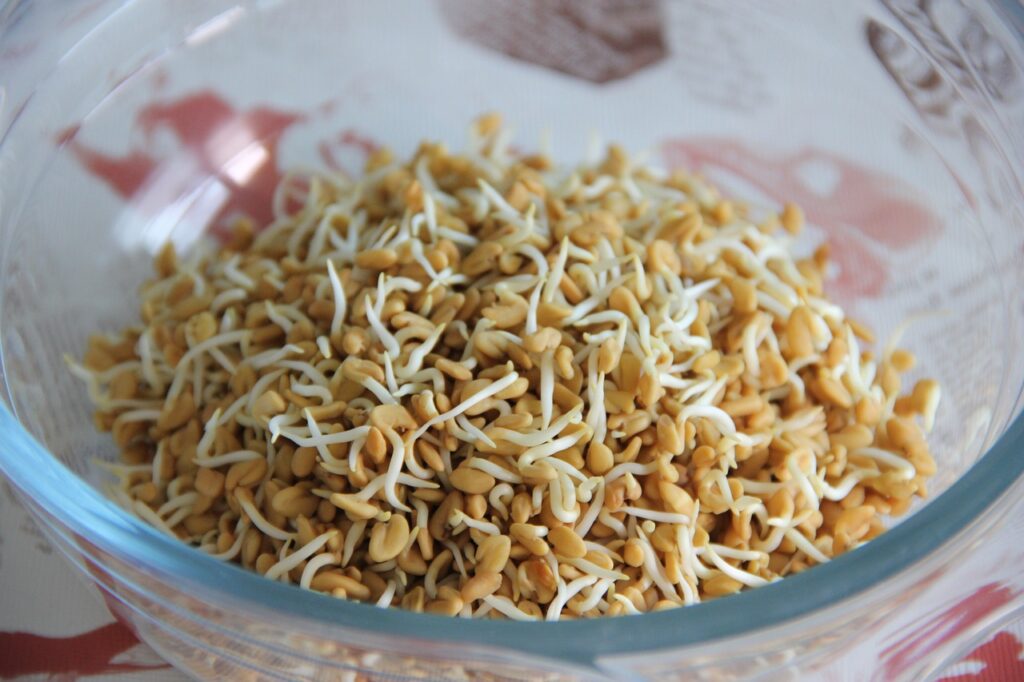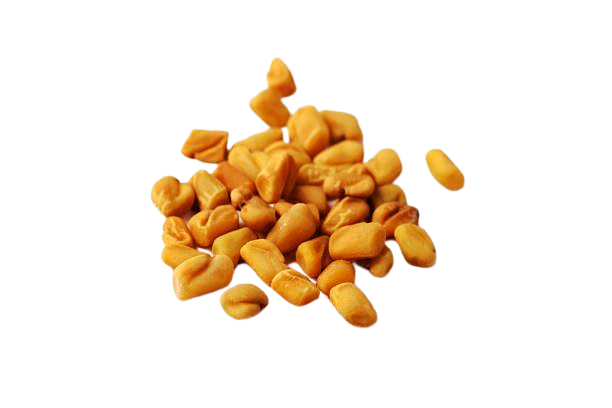Introduction: Fenugreek, a humble herb with a rich history, has gained significant attention for its numerous health benefits. Also known as “Methi,” fenugreek is widely used in traditional medicine and culinary practices. From promoting digestion to managing diabetes, this remarkable herb offers a plethora of advantages. In this article, we will explore the extraordinary fenugreek benefits and delve into the scientific evidence supporting its efficacy.
Rich in Essential Nutrients: Fenugreek leaves and seeds are packed with vital nutrients, making it a valuable addition to any diet. It contains a wealth of vitamins, including vitamin A, B-complex vitamins (thiamine, riboflavin, niacin), and vitamin C. Additionally, fenugreek is a good source of minerals such as iron, calcium, magnesium, and potassium. These nutrients contribute to overall health and well-being.
Supports Digestive Health: Fenugreek has long been revered for its positive impact on digestive health. The fiber content in fenugreek aids in preventing constipation and promoting regular bowel movements. It also acts as a natural laxative, relieving indigestion and other gastrointestinal discomforts. Fenugreek seeds are often used to alleviate symptoms of acid reflux and heartburn. The herb’s anti-inflammatory properties may help reduce inflammation in the gut and improve digestive conditions such as ulcerative colitis.
Manages Diabetes: One of fenugreek’s most notable benefits is its potential to manage diabetes. Several studies have shown that fenugreek can help lower blood sugar levels and improve insulin sensitivity. The soluble fiber in fenugreek slows down the absorption of sugar, preventing rapid spikes in blood glucose. Moreover, fenugreek seeds contain compounds that stimulate insulin production, assisting in the regulation of blood sugar levels. However, it is important to consult a healthcare professional before incorporating fenugreek into a diabetes management plan.
Enhances Breast Milk Production: Fenugreek has been used for centuries as a galactagogue to increase breast milk production in nursing mothers. The herb contains phytoestrogens that can mimic the effects of estrogen and stimulate milk production. Nursing women can consume fenugreek tea or incorporate fenugreek seeds into their diet to potentially enhance lactation. It is advisable to consult a lactation specialist or healthcare provider for appropriate dosage and guidance.
Boosts Testosterone Levels: Fenugreek has gained attention for its potential to enhance testosterone levels in men. Studies suggest that fenugreek supplementation can improve libido, increase muscle strength, and enhance overall sexual health. The herb contains compounds that may inhibit enzymes responsible for converting testosterone into estrogen, thereby helping to maintain optimal testosterone levels. However, further research is needed to fully understand the extent and mechanisms of fenugreek’s effects on testosterone.
Supports Weight Loss: Incorporating fenugreek into a weight loss plan may yield favorable results. The fiber in fenugreek promotes a feeling of fullness and reduces appetite, aiding in portion control. Additionally, fenugreek seeds may help regulate blood sugar levels, preventing sudden cravings and snacking. However, it is important to adopt a comprehensive weight loss approach that includes a balanced diet and regular exercise for optimal results.
Improves Heart Health: Fenugreek has been associated with several benefits for cardiovascular health. The soluble fiber in fenugreek helps reduce cholesterol levels by binding to bile acids in the intestine, preventing their reabsorption. As a result, the liver produces more bile acids by utilizing cholesterol from the blood, thereby lowering overall cholesterol levels. Furthermore, fenugreek contains compounds like saponins and flavonoids that exhibit antioxidant properties, which help protect against oxidative stress and reduce the risk of heart disease.
Supports Hormonal Balance in Women: Fenugreek has been traditionally used to alleviate symptoms associated with hormonal imbalances in women, such as menstrual cramps and menopausal discomfort. The herb contains compounds that possess estrogen-like effects, which can help regulate hormonal levels. Additionally, fenugreek may aid in reducing symptoms such as hot flashes, mood swings, and menstrual irregularities. However, it is important for women to consult with a healthcare professional before using fenugreek as a natural remedy for hormonal issues.
Enhances Skin and Hair Health: Fenugreek offers several benefits for skin and hair health. The seeds can be ground into a paste and applied topically as a face mask to reduce blemishes, acne, and inflammation. Fenugreek also possesses moisturizing properties that can help alleviate dry skin and promote a healthy complexion. Additionally, fenugreek seeds can be used as a natural hair conditioner to strengthen hair follicles, reduce dandruff, and promote hair growth.
Supports Immune System Function: The rich nutrient profile of fenugreek makes it a valuable ally in supporting a healthy immune system. The herb contains antioxidants, vitamins, and minerals that help strengthen the body’s defense mechanisms against infections and diseases. The antioxidants in fenugreek protect cells from damage caused by free radicals, reducing the risk of chronic diseases and supporting overall immune function.
Aids in Reducing Inflammation: Fenugreek possesses anti-inflammatory properties that can help alleviate inflammation and associated symptoms. The herb contains compounds like flavonoids and alkaloids that inhibit the production of inflammatory molecules in the body. This makes fenugreek beneficial for conditions such as arthritis, allergies, and respiratory ailments. However, it is important to consult a healthcare professional for proper dosage and guidance when using fenugreek as an anti-inflammatory remedy.
Potential Anti-Cancer Properties: Emerging research suggests that fenugreek may possess anti-cancer properties. Some studies have shown that fenugreek extracts exhibit anticancer effects by inhibiting the growth and proliferation of cancer cells, particularly in breast, prostate, and colon cancers. The high antioxidant content in fenugreek contributes to its potential in combating oxidative stress and reducing the risk of cancer development. However, further research is needed to fully understand the mechanisms and efficacy of fenugreek as an anticancer agent.
Conclusion
Fenugreek, a humble herb with a long history of traditional use, offers an impressive array of health benefits. From supporting digestive health and managing diabetes to enhancing breastfeeding and boosting testosterone levels, fenugreek’s versatility makes it a valuable addition to one’s wellness routine. Whether consumed as seeds, leaves, or extracts, fenugreek has the potential to improve various aspects of health. However, it is important to consult with healthcare professionals before using fenugreek for specific health conditions, ensuring optimal and safe utilization of this incredible superfood.






Pingback: Methi Ke Fayde : प्रकृति का सुपरफूड - carewithayurveda.com